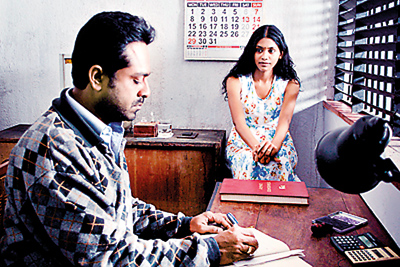Post-war melancholy caught in a gem of a film
OUT of the hundreds, or thousands, of movies we filmgoers have seen, some would have left a memory of a single face dominating the screen and leaving a mark on the mind. The faces may range from brooding and troubled to serene, happy or simply beautiful.
They stay with you long after you have left the theatre. Great films, great directors seize a face and make a legend out of it. You think of Ingmar Bergman, Satyajit Ray, Abel Gance, and especially Carl Dreyer, whose suffering Joan of Arc from 1928 has branded French actress Falconetti’s face in the memory of millions of film lovers.
Prasanna Vithanage’s film “Oba Nethuwa, Oba Ekke” has one such face, that of Shyam Fernando, a ruggedly handsome actor who deserves every frame dedicated to his powerfully grave face, which burns the screen with a masculine intelligence not often seen in the movies.
A highly respected theatre actor, Shyam Fernando projects finely nuanced facial expressions and a below-the-surface sensitivity that may not be immediately evident to theatre-goers but benefit from the camera’s close-ups. Even at middle-distance, his is still a compelling face.

Shyam Fernando and Anjali Patil in the Sri Lankan-Indian production “Oba Nethuwa, Oba Ekka.”
Shyam Fernando plays the part of a pawnbroker named Sarathsiri. His shop overlooks a road and a valley in the hills of Sri Lanka.
During the day he receives customers and gazes out on the world through the shop window, compassionately regarding the poor folk who come to him in states of financial desperation, forced to part with their most precious and intimate belongings in exchange for a sheaf of rupees.
He shares his customer’s private hardships mostly with his eyes. He lives upstairs above the pawnshop. In the evenings, he spends his time gazing at a vertical rectangle of sky, clouds, mountains seen through his bedroom window, and at the square image of professional wrestlers writhing on the TV screen. These three views morning and night are his world.
Pawnbroker Sarathsiri’s world changes when a beautiful but emotionally distant Tamil girl, wonderfully played by Indian actress Anjali Patil, appears at his shop window and starts surrendering her jewellery, piece by piece.
The two – brooding Sinhala man and unreal, will-o’-the-wisp Tamil girl – make an unlikely couple. They get married. The plot is taken from a Dostoevsky novelette.
The film grafts the Russian story’s outline and key moments onto a wholly locally conceived story, its soul and landscape soaked in Sri Lankan post-war melancholy, and its tensions arising from the simmering residue of inter-communal suspicion and resentment.
The second part of the movie starts clicking, against the background ticking of a grandfather clock, along an unexpected track with the discovery of a hidden revolver.
The colours match the film’s sombre mood. The lighting is mostly blue, as are the clothes the actors wear, the walls of the pawnbroker’s home, the distant misted mountains. When a flash of red or orange appears – in a sunset, a street scene, a table set for breakfast – it is muted.
Indian editor A.
Seekar Prasad has an exquisitely sensitive hand, holding a scene only for what it’s worth and cutting very finely. His split-second timing ensures no excesses.
Moments in danger of becoming cloying or embarrassing are saved in the nick of time; faces, rooms, landscapes, acts of eating, bathing, and making love, stay on the screen not a second too long.
The film plays out largely against a soundtrack of natural, everyday sounds. What music there is, written by Sri Lankan composer Lakshman Joseph de Saram, is spare, more Western than Asian in character, wistful chords and turns of phrase played on the piano and heard at the beginning and the end of the film.
The main and supporting roles are played to near perfection. None of the actors strike a false note. The brief non-verbal scene of a Muslim businessman in a topi unhurriedly checking out the pawnbroker’s up-for-sale premises is played with charm and delicacy by the handsome Mohamed Adamaly, the film’s co-producer.
“Oba Nethuwa, Oba Ekke” is a Sri Lankan-Indian production, and is director Prasanna Vithanage’s fifth film. He also did the adaptation and wrote the script. The film, which had its Colombo premiere recently, was released three years ago, and has won several awards and been screened at more than 30 international film festivals.
Anjali Patil was named Best Actress at the 2012 International Film Festival of India. See “Oba Nethuwa, Oba Ekke” as a worthy Sri Lankan contribution to world cinema and be proud that it’s the work of one of our gifted filmmakers.


